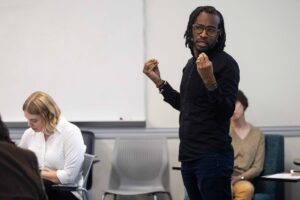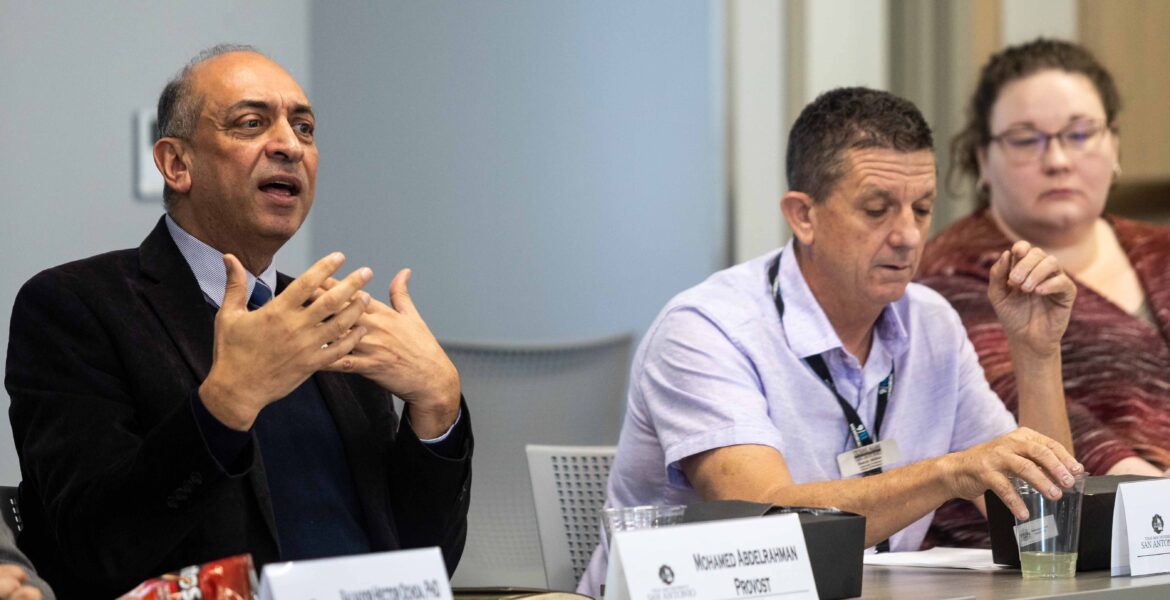Texas A&M University-San Antonio’s Faculty Senate on Nov. 4 discussed the expanding of inclusive access to online course materials, allowing students from neighboring universities to enroll in online classes here and supporting an SGA-led referendum while hearing student concerns.
Dr. Duane Williams, associate vice provost of Student Success and Retention explained the Inclusive Access program and how it can help students save money on eligible course materials from publishers such as Pearson and McGraw Hill.
“Instead of charging the retail price to students, it’s at a discounted rate,” Williams said. “So when you activate and you go to wherever you have to access it through Blackboard, students have it from day one, which was the real meat and muscle behind why we planned this, because it is saving a lot of money for students.”

Williams stressed that the Inclusive Access program is still not wide-scale yet at A&M-San Antonio, and it is not yet available to all faculty and students in all departments, as officials are still working on the “infrastructure.”
Williams also explained that the program is optional for faculty as well as students, and that both can choose to opt out of the program.
According to McGraw Hill’s page about Inclusive Access, the online learning materials are sold at the “lowest market price,” and a map on the webpage states that from April 1, 2022 to March 31, 2023, 137 institutions in Texas have an Inclusive Access program, and the savings realized in a year is $14,907,224.
Online classes may welcome students from other institutions
Students may see students from other universities in their online courses in the coming semesters due to a course sharing network called Acadeum.
University provost, Dr. Mohamed Abdelrahman addressed the university’s history with course sharing.
“Before I even arrived here on campus, we were mainly users of other universities’ courses,” Abdelrahman said. “So a student who doesn’t have a course that’s not offered on time, if that student needs to graduate and there is no other option on campus, that student can sign up for that university. They pay our tuition, we work an agreement with that other university, and the student transparently can take that course online.”
Abdelrahman brought up the idea of Acadeum being an alternative to having to cancel low enrolled online classes.
While A&M-San Antonio currently only uses course sharing to send students to take courses at other institutions, it is unlikely that this university will be receiving students from other institutions in the near future.
“Are we going to be doing it in the spring? Most likely we are not going to be doing it in the spring,” Abdelrahman said.
University president gives campus updates
Dr. Salvador Hector Ochoa, university president, provided an update on his listening tours and how the sessions have allowed faculty and students to voice their needs.
Some of these updates include:
- A three-year academic calendar will now be implemented to allow for students to plan ahead.
- Data for the parking shuttle has been gathered from Oct. 31 – Nov. 3. On its first day, the shuttle service was used 169 times, 408 times on its second day, 294 times on its third day and 301 times on Nov. 3.
- To remain in the Red River Athletic Conference, A&M-San Antonio must increase its number of sports from four to six. To help accomplish this, A&M-San Antonio will be introducing both women’s and men’s basketball during the 2024 academic year. Rec Sports will also be moved under student affairs.
SGA president promotes Student Union and voices student concerns
Ochoa introduced the university’s Student Government Association president, Deane Gumila, and discussed SGA’s Student Union referendum.
“She’s taking some very bold moves as a president and to really push this initiative, to me is real strategic leadership,” Ochoa said.
Voting for the Student Union Referendum opened at 8 a.m. on Nov. 6, and is open until 5. p.m. Nov. 10.

Gumila described the Student Union as a place that can house student organizations and their offices while also allowing the university to inhouse its services by having facilities such as a dining hall and ballroom.
In addition to serving student organizations, the Student Union would also provide more space for students to use whether to study or relax.
If the referendum passes, the SGA has proposed a fee structure that would be added to student’s tuition beginning in the fall 2024 semester.
According to the JagSync voting page, the proposed fees over time would be:
- Year 1: During the fall 2024 semester, a Student Union fee of $100 a semester ($50 in the summer) will be added to Tuition and Fees.
- Year 3: In 2026, the Student Union fee would increase to $125 a semester ($75 in the summer).
- Year 5: In 2028, the Student Union fee would increase to $150 a semester ($100 in the summer).
Gumila said if the referendum is passed, SGA hopes to have the Student Union built in seven years.
Ochoa suggested that the construction could be expedited through donations, and that the building itself could be a revenue source for student organizations by leasing space for events such as hosting speakers.
The building would be able to house 40,000 students at a time.
Gumila also relayed student concerns over class registration.
Gumila said she has heard that some students are not able to register for some classes, which can cause them to either go to school part time and lose their scholarships and financial aid, or go full time and take filler classes that some other students may need.
Abdelrahman said this concern could be addressed by the online course sharing program Acadeum.
Gumila said students have voiced that they would like to have fewer online courses.
“Based on what we’ve heard from students, they would like to have less online classes because they don’t go to our university to take online classes, they’d rather have in-person classes,” Gumila said. “So I think Acadeum would be a last resort.”







